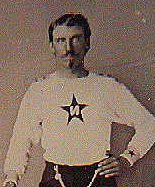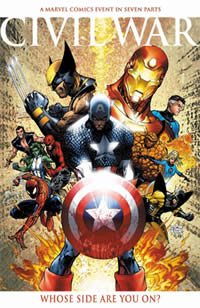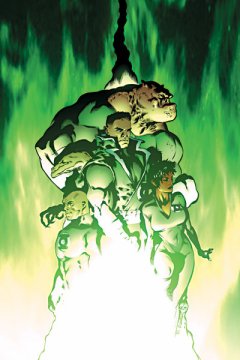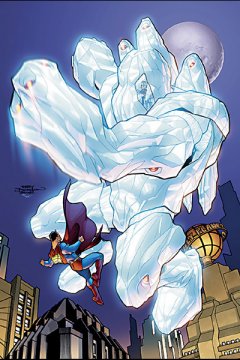|
|
|
Jason
Schachat has the combined powers of the
Fantastic Four Food Groups.
|
Jason
Schachat's Occasional Breakdown
6/19/06 Granted,
the whole Annihilation event has been a bizarre
attempt to mimic DC’s Rann-Thanagar War,
but few comics were less anticipated than Annihilation:
Super Skrull #3. Deeming himself to be the
Riddick of the Marvel Universe, Super Skrull has taken us
on quite the wild goose chase-- and for no good reason.
Oh, wait. Money. Yeah, I knew there was
some motive to sell this thing...
Fresh from invading the N-Zone and taking
over a prison planet where the creator of the Annihilation
Wave’s great doomsday device has taken residence,
Super Skrull forms a small army from the super-powered prisoners.
And he builds a fleet. End of issue.
Sorry,
it’s just not that interesting. He’s a villain…
because he’s evil? Wow, how original. About as well
thought-out as a galactic despot who’s taking over
our universe just because it’s there. Honestly, what
the bloody hell are we reading ALL this stuff for? You can’t
just criticize Grillo-Marxuach for this run-of-the-mill
Super Skrull story when Giffen’s Silver Surfer
and Abnett and Lanning’s Nova are wandering
around just as aimlessly.
This whole venture has yet to justify itself.
Super Skrull probably suffers more than the others because
it makes a universal holocaust look like a silly cartoon.
The story is dull, but at least the characters have a solid
goal. More than you can say for Marvel Editorial.
|
|
Five
of these parts could be cut.
|
Civil
War #2 will probably end up dividing comic
fans just as much as the heroes it revolves around. Strangely
enough, I have to admit that I like it. Why? Well, I probably
lean more towards “new school” fanboys. The
type to get dazzled by intricate computer coloring and stories
that stretch continuity to make lackluster characters interesting
again (dammit, the world needed a strong Catman).
But, as in the previous issue, we’re
still setting up the story. Sides are being chosen, bridges
are being burned, and alliances are being forged. The Fantastic
Four and remnants of the old Avengers have sided with Iron
Man and take to the streets once again, re-earning the trust
of the public. Meanwhile, Captain America continues to hunt
down villains in the sewers and subways; out of sight, but
certainly not out of mind.
The
main flaw of this book lingers at the back of the readers’
mind, though; what side are the big guns on? No offense
to the eggheads (Iron Man, Mr. Fantastic, and Yellow Jacket),
but they’re fighting against Captain America, Nick
Fury, Daredevil and Wolverine. When it comes to sheer badassedness,
Cap’s way ahead.
Of course,
the key figure is Spider-Man. He’s the character this
all hinges on. Siding with Iron Man still feels unnatural,
even if the events it leads to are rather entertaining.
It’s just damn hard to believe he’s going to
stick with the government, knowing him like we do.
And
that may be the dividing line between old and new fanboys.
The production on this book is fantastic, and it’s
done in the same widescreen style that’s made Ultimates
and Astonishing X-Men such rousing reads.
It also stretches believability to its limits.
Has enough of a bond formed for Spidey to trust Iron Man
to work things out? Possibly. Does it justify the complete
flip-flop of one of Spidey’s core beliefs? Not such
an easy question.
However, I think Steve McNiven and company
make such a gorgeous book, it’s hard not to recommend.
Mark Millar’s less rabid here than Ultimates, but
missing the protection of an alternate universe. The end
result is worth a read but may be too much for purists too
take.
|
|
Which
one is the all-powerful Oz?
|
Like
so many post-Infinite Crisis books, Green Lantern
Corps #1 suffers from the now habitual ass-dragging
of trying to re-cap the last year of continuity when it
should just tell a story. Rather than start up an exciting
new adventure, Dave Gibbons returns us to the half-resolved
conflicts of Green Lantern Corps: Recharge, Green Lantern
and scraps of Rann-Thanagar War.
First, we bump into Natu, the most medical
of all Green Lanterns, as she and her partner come to the
aid of a kingdom under siege. Unfortunately, her will still
isn’t too strong. The death of an ally dashes her
desire to remain a Lantern, and she heads to Oa with plans
to resign. Guy Gardner continues his power struggle with
the bureaucratic Salaak and finds himself babysitting newbies
once again.
Dysfunctional
duo Kol and Samot are still at each others’ throats,
Kilowog remains the rock the Corps is built on, and the
Guardians keep their little blue carcasses out of sight.
One issue in, and all that’s changed is we have a
new planet to protect. This is the kind of info. that should
take one page - not twenty.
Like
the cluttered and redundant story, Patrick Gleason’s
pencils are just a bit too clunky for some scenes. Much
cleaner and easier on the eyes than Ion: Guardian of
the Universe, but Green Lantern stories benefit from
smoother, rounder lines. This book may have a chance once
they decide to tell us a story, but this first issue is
D.O.A.
One
good thing we can say about the penultimate chapter of “Up,
up, and Away” presented in Superman #653:
at least it didn’t take a year to get here. Reading
Superman story arcs can be like Chinese water torture towards
the end, but this one has been done quickly enough to be
almost painless.
Almost.
Lex Luthor, now completely removed from
the tycoon/politician identity he’s held for the last
two decades, pilots an ancient Kryptonian battlecruiser
that can rain down missiles which turn into Kryptonian mecha.
Before the other heroes of Earth can come to Metropolis’
aid, Luthor also decides to erect an impenetrable force
field around the city.
Superman almost finds the fight a challenge,
but tears right through Luthor’s new toy until Lex
charges it up with all the kryptonite he could get his hands
on. And then they fight some more.
As in so many Superman stories, this is
the “fight” issue. We’ve had the three
issues of mystery and three issues of pre-showdown wrassling,
so now it only makes sense that this one is almost constant
brawling. Kurt Busiek and Geoff Johns are kind enough to
explain where the heck the Kryptonian ship came from, but
nothing’s really surprising, and the outcome of the
fight is neither creative nor satisfying. Rather than letting
Supes use his brain, it all comes down to brute strength.
|
|
Careful!
That suit's Waterford!
|
And I’m just not sure what I think
about this version of Lex Luthor. Even though most of his
outings in recent years have been a bit dull, Lex got a
lot out of being such a rational, composed villain. He almost
had us thinking he was a decent guy, and that made him even
more dangerous. This return to the cackling mad scientist…
well… let’s hope some good comes of it in the
future.
Part
of the success of the X-Men franchise has been balancing
how much the team hate and love each other; that’s
what makes Ultimate X-Men #71
so promising. Not because of the “Mary Sue”
new team member (now calling himself Magician because of
his reality altering powers… oh, how I hate reality
altering powers). No, it’s because scribe Robert Kirkman
knows teenagers are leaky bags of emotional chaos who’ll
want to take on the world AND run away from it in the span
of thirty seconds.
Having
widdled away the cluster of plotlines that started this
arc, this outing has us alternating between the X-Men’s
fight with the Brotherhood of Mutants (at Ms. Frost’s
school dance, no less) and the results of Lilandra’s
attempt to awaken the Phoenix in Jean Grey. The fight at
the dance loses some momentum when it becomes focused on
Blob (pun not intended, but I’m stickin’ with
it) and, for the most part, becomes the excuse for Magician’s
instant rise to stardom.
The
awakening of the Phoenix, on the other hand, fits smoothly
into the Ultimate X-Men mythos and does quite well
what X-Men 3: The Last
Stand could not do: pay off on the long-established
possibility that Jean Grey is a ravening schizophrenic who’s
gonna murder them all. But this creative team has also tamed
the dangerous prospect of introducing the Shi’ar as
a cult from the same twisted culture as the Hellfire Club.
Without spaceships or interstellar empires, thankfully.
We still
have yet to see where he’s going with this whole Magician
thing, but Kirkman’s willingness to explore Colossus’s
romantic side, cast Nightcrawler as a latent homophobe,
and make this randy group of teenagers act just like what
they are is a promising start. Finally, the magic that we
saw in Invincible is starting to show in one of
his Marvel books.
|









